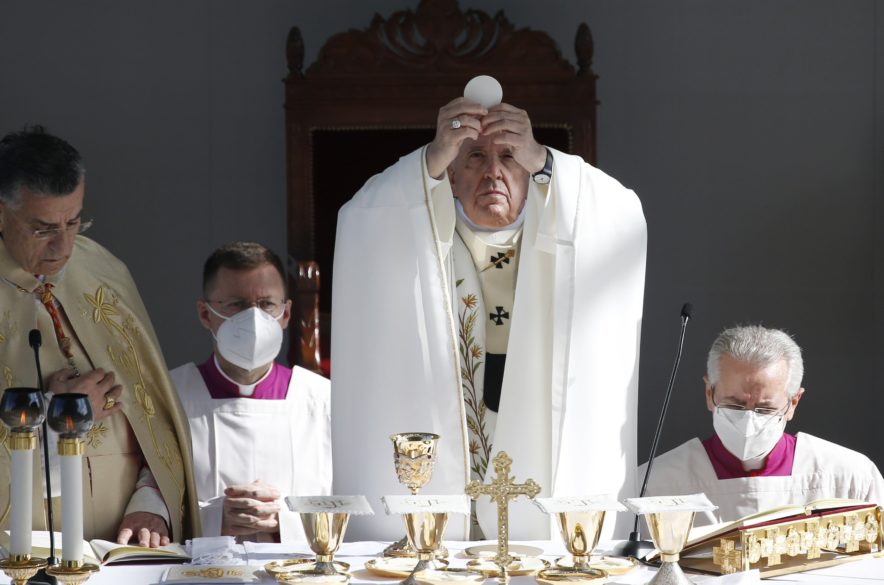By Cindy Wooden
VATICAN CITY (CNS) – The “sense of mystery” and awe Catholics should experience at Mass is not one prompted by Latin or by “creative” elements added to the celebration, but by an awareness of sacrifice of Christ and his real presence in the Eucharist, Pope Francis said.
“Beauty, just like truth, always engenders wonder, and when these are referred to the mystery of God, they lead to adoration,” he wrote in an apostolic letter “on the liturgical formation of the people of God.”
Titled “Desiderio Desideravi” (“I have earnestly desired”), the letter was released June 29, the feast of Sts. Peter and Paul. The title comes from Luke 22:15 when, before the Last Supper, Jesus tells his disciples, “I have earnestly desired to eat this Passover with you before I suffer.”
In the letter, Pope Francis insisted that Catholics need to better understand the liturgical reform of the Second Vatican Council and its goal of promoting the “full, conscious, active and fruitful celebration” of the Mass.

“With this letter I simply want to invite the whole church to rediscover, to safeguard and to live the truth and power of the Christian celebration,” the pope wrote. “I want the beauty of the Christian celebration and its necessary consequences for the life of the church not to be spoiled by a superficial and foreshortened understanding of its value or, worse yet, by its being exploited in service of some ideological vision, no matter what the hue.”
While his letter offered what he called a “meditation” on the power and beauty of the Mass, Pope Francis also reiterated his conviction of the need to limit celebrations of the liturgy according to the rite in use before the Second Vatican Council.
“We cannot go back to that ritual form which the council fathers, ‘cum Petro et sub Petro,’ (with and under Peter) felt the need to reform, approving, under the guidance of the Holy Spirit and following their conscience as pastors, the principles from which was born the reform.”
The liturgical books approved by “the holy pontiffs St. Paul VI and St. John Paul II,” he said, “have guaranteed the fidelity of the reform of the council.”
Although the post-Vatican II Mass is celebrated in Latin and dozens of vernacular languages, he said, it is “one and the same prayer capable of expressing her (the church’s) unity.”
“As I have already written, I intend that this unity be reestablished in the whole church of the Roman rite,” he said, which is why in 2021 he promulgated “Traditionis Custodes” (Guardians of the Tradition), limiting celebrations of the Mass according to the rite used before the Second Vatican Council.
The bulk of the pope’s new letter focused on helping Catholics learn to recognize and be astounded by the great gift of the Mass and the Eucharist and how it is not simply a weekly “staging” or “representation” of the Last Supper but truly allows people of all times and all places to encounter the crucified and risen Lord and to eat his body and drink his blood.
And, the pope wrote, it is essential to recognize that the Mass does not belong to the priest or to any individual worshipper, but to Christ and his church.
Pope Francis said “the non-acceptance of the liturgical reform” of Vatican II, as well as “a superficial understanding of it, distracts us from the obligation of finding responses to the question that I come back to repeating: How can we grow in our capacity to live in full the liturgical action? How do we continue to let ourselves be amazed at what happens in the celebration under our very eyes?”
“We are in need of a serious and dynamic liturgical formation,” he said.
